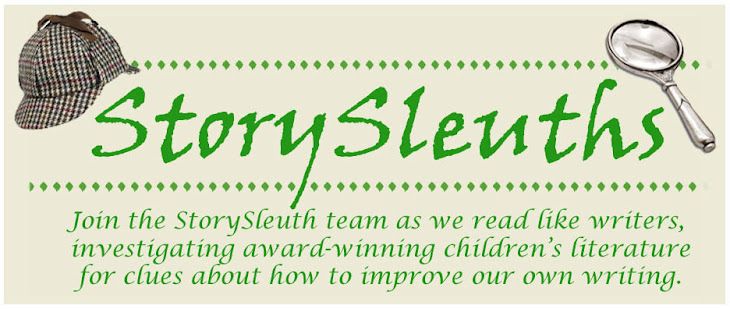Thinking about how engaging One Crazy Summer might be for teachers to read with children, StorySleuths asked master teacher and 2008 Newbery Committee member Monica Edinger to share her thoughts and experiences of reading the story aloud to her class. Her insights illuminate considerations we as writers would do well to heed. For more of her insights about books for children, reading, writing, teaching, and much more, check out her blog Educating Alice. (Photo is of Rosemary Brosnan and Rita Williams-Garcia with Monica.) This post may make you wish your children could be in Monica’s class!
When I received the ARC for One Crazy Summer around a year ago, I took a look at the flap copy and was immediately intrigued. The summer of 1968? Folks in Afros and black berets? A time and people that I’d yet to see much of in stories for the age group I taught --- fourth graders. Those I had encountered often felt overly earnest, their authors working hard to make connections to situations today, say linking the Vietnam War to our current engagements in Afghanistan and Iraq. Or they focused on familiar icons and events of the civil rights movement. This book looked different.
And so it turned out to be. During that first reading a year ago I fell completely in love with those three sisters, their story, and Rita’s poetic and elegant prose. Months later, after learning that I’d reviewed it for the New York Times, my fourth grade students asked me to read it to them. They were alert and insightful listeners --- laughing as Fern said yet again “surely,” curious about the Black Panthers (I showed them that photo of Huey with the shotgun), and moved (not upset) by the girls’ complex mother.
As I read and reread the book, on my own and to my students, I was progressively more and more impressed with Rita’s sensitivity for her intended audience. I've noticed that this is a particularly tricky thing for those writing for children. Some claim not to be aware of their audience while others seem too aware. Don’t you, I've ask some writers, think about your intended reader when writing? No, some of them answer, I only think about the story. But, I will persist, you clearly make decisions that affect that audience. You use one word instead of another. You consider what a young person will know or not know. Perhaps you do it unconsciously, but you do it. No, they will tell me, I just think about my story not about who will read it.
At the other end of the spectrum are those writers who over-think and over-focus on their young readers. These are writers who earnestly and always with the best of intentions, moralize and instruct all too obviously. One hilarious example is Lewis Carroll who talks down most cloyingly to his young audience in his Nursery Alice. One of my students did a wonderful parody of this with, of all things, The Golden Compass.
Rita, I feel, manages this tightrope just right. She respects her young readers, trusts them, and serves them beautifully. While not shying away from having Cecile tell Delphine about her sad and hellish childhood, she does it in a way appropriate for a middle grade reader. What it needed to be, but no more. Similarly, she doesn’t overdo the Black Panther information, giving them a taste, but no more.
This spring Rita visited my classroom and met with our faculty book group where she spoke of deep awareness and personal connection to the Black Panthers. Yet she was very careful not to allow that personal knowledge to take over the story --- she always kept it completely grounded in Delphine, just the way it needed to be for her and for the children today who would read the story. For more about our day with Rita, how I read the book to my students, and their own responses to it please check out this blog post of mine, One Crazy Day.
Thank you, Monica, for this stunning and insightful post, which wraps up our StorySleuths focus on One Crazy Summer.
StorySleuths Tip # 84: Be aware of the audience and adjust the writing accordingly, but don’t overdo this so the writing becomes didactic or forced.





